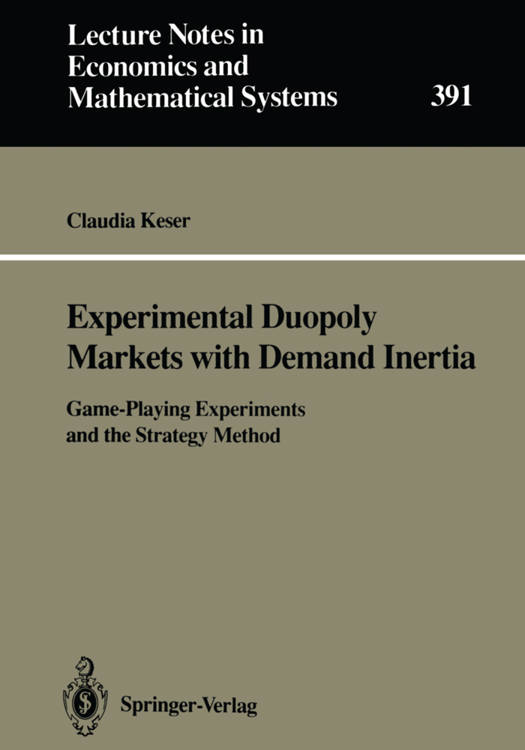
- Retrait gratuit dans votre magasin Club
- 7.000.000 titres dans notre catalogue
- Payer en toute sécurité
- Toujours un magasin près de chez vous
- Retrait gratuit dans votre magasin Club
- 7.000.0000 titres dans notre catalogue
- Payer en toute sécurité
- Toujours un magasin près de chez vous
Experimental Duopoly Markets with Demand Inertia
Game-Playing Experiments and the Strategy Method
Claudia Keser
52,95 €
+ 105 points
Description
This report portrays the results of experimental research on dynamic duopoly markets with demand inertia. Two methods of experimentation are studied: game-playing experiments where subjects interact spontaneously via computer terminals, and computer tournaments between strategies designed by subjects. The principal aim of this study is the understanding of boundedly rational decision making in the dynamic duopoly situation. 1. 1 Motivation The experiments examine a multistage duopoly game where prices in each period are the only decision variables. Sales depend on current prices and also on past sales (demand inertia). Applying the game-theoretic concept of subgame perfect equilibrium, the game is solved by backward induction. The result is a uniquely determined system of decision rules. However, we can hardly expect that human beings behave according to the equilibrium strategy of this game. It is unlikely that subjects are able to compute the equilibrium. And even if a subject is able to compute it, he might not make use of this knowledge. Only if he expects the others to behave according to the equilibrium, it is optimal for him to play the equilibrium strategy. We have evidence from several earlier experimental studies on oligopoly markets that, even in less complex oligopoly situations where the equilibrium solutions are very easy to compute, human behavior often is different from what is prescribed by normative theory. ! Normative theory is based on the concept of ideal rationality. However, human capabilities impose cognitive limits on rationality.
Spécifications
Parties prenantes
- Auteur(s) :
- Editeur:
Contenu
- Nombre de pages :
- 150
- Langue:
- Anglais
- Collection :
- Tome:
- n° 391
Caractéristiques
- EAN:
- 9783540560906
- Date de parution :
- 17-12-92
- Format:
- Livre broché
- Format numérique:
- Trade paperback (VS)
- Dimensions :
- 170 mm x 244 mm
- Poids :
- 276 g

Les avis
Nous publions uniquement les avis qui respectent les conditions requises. Consultez nos conditions pour les avis.






